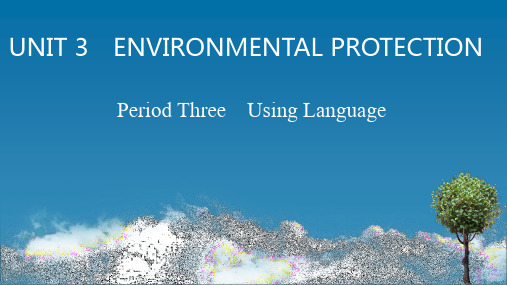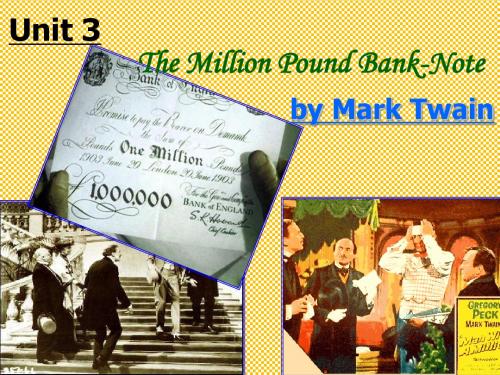高中英语必修三 Period 3 课件
高中英语必修三第三单元课件(全图文)

When answering reading comprehension questions, read the passage carefully and identify the main ideas and important details. Then, use these ideas to answer the questions as accurately as possible. If you are unsure about an answer, reread the relevant part of the passage to clarify your understanding.
01
CATALOGUE
Unit Theme Introduction
Theme background
时代背景
本单元主题与现代社会的发展密 切相关,涉及到环境保护、科技 创新、全球化等热门话题。
文化背景
本单元融合了东西方文化元素, 旨在培养学生的跨文化交流能力 ,了解不同文化背景下的观点和 价值观。
Simple sentences
Identify and analyze sentences that are free of complex grammatical structures or multiple clauses.
Complex sentences
Examine sentences that contain subordinate clauses, relative clauses, or long, involved structures. Analyze how the author uses them to convey important information or create a specific effect.
人教版高中英语必修三Unit3全课件

人教版高中英语必修三Unit3全课件一、教学内容本节课我们将学习人教版高中英语必修三的Unit 3。
具体内容包括:1. 教材章节:Unit 3 – The Million Pound Bank Note2. 课文内容:本章主要讲述了两个人物因为一个百万英镑的银行支票而引发的一系列故事。
二、教学目标1. 学生能够理解并掌握课文中的重点词汇和语法结构。
2. 学生能够通过阅读和分析课文,提高阅读理解能力,特别是对戏剧文本的理解。
3. 学生能够运用所学知识进行口头和书面表达,提升交际能力。
三、教学难点与重点1. 教学难点:理解戏剧文本中的幽默和讽刺元素;掌握并运用过去进行时和过去完成时的区别。
2. 教学重点:课文中的重点词汇和语法结构;阅读理解的技巧;口头和书面表达能力的培养。
四、教具与学具准备1. 教具:多媒体教学设备、黑板、粉笔、卡片等。
2. 学具:课本、笔记本、词典、文具等。
五、教学过程1. 导入:通过播放一段关于戏剧的短片,激发学生对戏剧的兴趣,引入课文主题。
2. 阅读前:让学生预测课文内容,激发阅读兴趣。
3. 阅读中:引导学生阅读课文,讲解重点词汇和语法结构,分析戏剧文本的特点。
4. 阅读后:进行例题讲解,组织随堂练习,巩固所学知识。
a. 讲解:针对课文中的重点和难点进行讲解。
b. 练习:分组讨论,进行角色扮演,提高学生的口头表达能力。
c. 互动:学生展示练习成果,教师给予反馈和指导。
六、板书设计1. Unit 3 – The Million Pound Bank Note2. 重点词汇:列出课文中的重点词汇,如:bribery, coincidence, criticize等。
3. 语法结构:展示过去进行时和过去完成时的区别及用法。
七、作业设计1. 作业题目:1. What is the main idea of the story?2. How did the two characters react to the million pound bank note?b. 仿照课文,编写一个关于意外之财的小故事。
人教版高中英语必修三Unit3全课件

5.intelligence [U] n. 智力,才智;消息,情报 搭配: have the intelligence to do sth 有做某事的智 慧 eg: He didn’t even have the intelligence to call for an ambulance. intelligent adj.聪明的 6.from…on 从某时开始,从某时以后 from then/that time on 从那时起,一般用:”一般过去 时 from now on 从现在起,一般用:“一般将来时 I will study hard from now on. I remebered her words from then on.
18.watch over (1)看管,照顾 eg: Will you watch over my clothes while I have a swim. (2)看守,监视,守卫,保护 eg: They were watched over by three policemen. watch out 注意,留神 keep a watch on 监视
4.artificial adj. (1)人工的,人造的,假的 eg: artificial intelligence 人工智能 (2)人为的,非自然的 eg: A job interview is a very artificial situation. (3)虚假的,假装的 eg: artificial emotion 假装的感情
6.Result n./v.结果,发生,产生作用或结果 As a/the result 最终,结果(插入语或句首) He is very handsome. As a result,many girls fall in love with him. He didn’t work hard, as a result, he was dismissed. As a/the result of (=because of )由于(+n/ving,做原因状语, 可放在句中或句首) As a result of/Because of the weather, all the crops grow well. They were punished as a result of cutting trees without permission. Result in 导致(结果) result from 由于(原因,谓语) The company resulted in failure. The traffic jam results from bad weather.
人教版高中英语必修三Unit3全课件

人教版高中英语必修三Unit3全课件一、教学内容1. Reading and Writing: The millionpound bank note(百万英镑)2. Listening and Speaking: Money matters(金钱问题)3. Grammar: Comparative and superlative adjectives(比较级和最高级形容词)4. Vocabulary: Words related to money and finance(与金钱和金融相关的词汇)二、教学目标1. 学生能够理解并掌握文章《百万英镑》的主要内容和细节。
2. 学生能够运用所学词汇和语法知识,就金钱和金融主题进行讨论和表达。
3. 学生能够提高听说能力,学会在日常生活中运用比较级和最高级形容词。
三、教学难点与重点1. 教学难点:比较级和最高级形容词的用法,以及金钱和金融相关词汇的掌握。
2. 教学重点:文章《百万英镑》的理解,以及听说能力的培养。
四、教具与学具准备1. 教具:多媒体课件、黑板、录音机、磁带。
2. 学具:课本、练习本、词典。
五、教学过程1. 导入:通过展示一组与金钱相关的图片,引导学生讨论金钱在日常生活中的重要性。
2. 阅读理解:学生阅读文章《百万英镑》,教师提问并讲解文章细节。
3. 例题讲解:讲解比较级和最高级形容词的用法,并给出例句。
4. 随堂练习:学生完成教材中的练习题,巩固所学知识。
5. 听力训练:播放与金钱相关的听力材料,学生完成练习题。
6. 口语练习:分组进行讨论,运用所学词汇和语法知识,就金钱和金融主题进行表达。
六、板书设计1. 文章《百万英镑》2. 比较级和最高级形容词的用法3. 金钱和金融相关词汇七、作业设计a. 选择题:选出正确的比较级或最高级形容词。
c. 写作:以“金钱观”为主题,写一篇短文。
答案:见教材附录。
八、课后反思及拓展延伸2. 拓展延伸:鼓励学生阅读与金钱和金融相关的课外文章,提高阅读和听说能力。
人教版高中英语选择性必修三 UNIT 3 Period 3

Period Three Using Language
英语 选择性必修 第三册 配人教版
UNIT 3 ENVIRONMENTAL PROTECTION
课前自主预习
课前自主预习
课堂新知讲练
课文读练专训
随堂知能小练
写作高效提升
课时作业
英语 选择性必修 第三册 配人教版
英语 选择性必修 第三册 配人教版
UNIT 3 ENVIRONMENTAL PROTECTION
序号 重点词汇
6 dozen
7 inspection
8
fine
9 campaign
音标 /ˈdʌzn/ /ɪnˈspekʃn/ /faɪn/
/kæmˈpeɪn/
词性 n. n. vt. n.
vi. &vt.
水污染程度加剧,越来越多的家庭和商业用水流入河流。
课前自主预习
课堂新知讲练
课文读练专训
随堂知能小练
写作高效提升
课时作业
英语 选择性必修 第三册 配人教版
UNIT 3 ENVIRONMENTAL PROTECTION
3 . Local officials ________________ the pollution was damaging the natural environment and felt that urgent steps should be taken to restore the river’s original beauty. (be concerned that从 句)
课前自主预习
课堂新知讲练
课文读练专训
2021新教材英语课件 外研版高中英语必修三课件全册课件0

➢ Tell your friend you are angry with him for repeating what you said and making the situation worse, but that you want to move on. Approached in this way, your friendship rt 2 Understanding ideas
Step 3
Activity 4 Find specific information Read the letters carefully and complete the sentences with expressions from the passage. 1 the team were let down 2 to let off steam 3 went and told everyone else what I’d said 4 apologise to your teammate 5 communicating with each other clearly 6 resolving conflicts 7 repeating what you said 8making the situation worse 9 say too much 10 think first, speak later
英语必修三第三单元ppt课件

RESUME
REPORT
CATALOG
DATE
ANALYSIS
SUMMARY
目录
CONTENTS
Unit Theme IntroductionText AnalysisSorting out grammar knowledge pointsPractice and consolidationUnit Summary and Reflection
True or False Questions: Provide students with a passage and ask them to identify whether each statement in a series of questions is true or false based on the information in the passage. This exercise tests their ability to understand and analyze information in a passage.
Language skills:This unit has greatly improved my language skills in English, especially in reading and writing. I have learned many new words and sentence structures, which have expanded my vocabulary and enhanced my ability to express myself.
人教新课标高中英语必修3Unit3课件(共25张PPT)

Careful - reading
Read carefully and answer the following questions:
1. Where does Henry Adams come from? Does he know much about London?
2. What did he do in America? 3. Why did he land in Britain?
How he feels Angry, irritated
When they give Wants to open the him the envelope envelope straightaway
Irritated that he cannot open the envelope at once When they tell Explains he wants a job Unhappy to be given him there is not charity money rather than money in it working for it Before he leaves Agrees not to open the Interested and curious the house letter till 2 p.m.
Retelling
Retell the story by filling the following passage. Henry was an_________. American One day he had an bay Luckily he was survived by a accident in a_____. London He arrived in London by earning ship for_______. lost the street his passage without pay. He was _____in incredible thing rags To his surprise an ________ in_____. happened. Two rich brothers gave him a million
- 1、下载文档前请自行甄别文档内容的完整性,平台不提供额外的编辑、内容补充、找答案等附加服务。
- 2、"仅部分预览"的文档,不可在线预览部分如存在完整性等问题,可反馈申请退款(可完整预览的文档不适用该条件!)。
- 3、如文档侵犯您的权益,请联系客服反馈,我们会尽快为您处理(人工客服工作时间:9:00-18:30)。
3) 行文方便的需要。
The actor appeared on the stage and was warmly applauded by the audience. 演员在台上出现,观众给予了热烈的掌声。
3. 被动语态应注意下面几点
1) 短语动词的被动语态,要保持短语动词 的完整性,动词后面的介词或副词切记不 可遗漏。 These books must be taken good care of. 这些书必须好好保管。 The children were well looked after. 孩子们受到了良好的护理。
across the channel. 4) 有些动词主动语态形式表示被动语态,
如:sell, wash, draw, keep, prove, clean, run, wear, cook, read, smoke, cut, burn等。注意 这是表示事物的属性,并不表示具体动作。 The book sells well. 这本书畅销。 This model of car drives well. 这款车好开。
1. 被动语态的构成 1)一般现在时 am/is/are + v-ed
Trees are planted in spring. 春天植树。 2)一般过去时 was/were + v-ed
The palace was completed last week. 这个宫殿是上周完工的。 3)一般将来时 will be + v-ed
People wiபைடு நூலகம்l be allowed to leave here. 人们将被允许离开这里。
4)现在进行时和过去进行时
① A new bridge is being built. 一座新桥正在建设之中。
②The museum was being designed then. 那时博物馆正在设计中。
4. The acient Greeks built the Parthenon during this period.
→The Parthenon was built by the acient Greeks during this period.
GRAMMAR
主语
谓语
More than eight million tourists visit Paris every year.
4. Practice:
(一)将下列句子变成被动语态 1. Every day trucks carry goods to the city. →Goods are carried by trucks to the city every day. 2. The author has published two collections of poems. →Two collections of poems have been published by the author .
被动语态(Passive Voice)表示句子的主 语是动作的承受者。其句子的谓语动词 是:be + v-ed形式。
语态只表示句子的主语和谓语动词之间 的关系,它没有表示动作发生的时间和 方式,因此,被动语态形式的句子和主 动语态一样有各种时态变化。由于构成 被动语态的行为动词变成了动词-ed形式, 所以,被动语态句子的时态都要体现在 助动词be上。
5)现在完成时和过去完成时
①This book has been translated into English. 这本书已被译成英语。
②The housework had been finished by then. 那时家务事已经做完了。
2. 被动语态的用法 1) 说话人不知道或没有必要说明动作的执
2) 带双宾语的动词的被动语态:
(give, send, take, bring, teach, tell, offer, sing, buy, show, pay等)将其中一个宾语变 成主语,另一个宾语作为保留宾语,或变 为介词宾语,作状语。
We gave her some picture-books.
→She was given some picture-books.
→Some picture-books were given to her.
3) 情态动词的被动语态:情态动词+be+v-ed
The architect can build a tunnel across the
channel.
→A tunnel can be built by the architect
Look at the following sentences. 1. An architect designed the Sagrada Familia.
→The Sagrada Familia was designed by an architect .
2. Great artists produced Florence’s most beautiful paintings and sculptures.
→Florence’s most beautiful paintings and sculptures were produced by great artists.
3. People know Athens as the birthplace of western civilisation.
→Athens is known as the birthplace of western civilisation.
行者是谁(不带by+施动者)。
The article is written for designers. 这篇文章是写给设计师们看的。 2) 强调动作的承受者(可带by+施动者)。
The landmark was designed by a woman architect. 这个地标是由一位女建筑师设计的。
宾语 时间状语
主语 谓语
动作发出者
Paris is visited by more than eight million tourists every year.
时间状语 Passive Voice
语态(Voice)是动词的一种形式,它表示 句子的主语和谓语动词之间的关系。语 态通常分为主动语态和被动语态。
